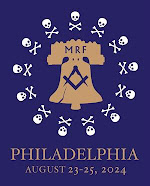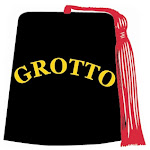 |
| Title page. |
This edition of The Magpie Mason is a long one. I share with you a chapter from The Evolution of Freemasonry: An Authentic Story of Freemasonry, Profusely Illustrated with Portraits of Distinguished Freemasons and Views of Memorable Relics and Places of Singular Masonic Interest by Delmar Duane Darrah in 1920. This chapter reflects on the convivial traditions of smoking and drinking in lodge during Freemasonry’s early years. Some of it is a little humorous; there are a few mentions of New York Masonry; and it concludes on a happy, hopeful note. I added a few photos and other graphics. Enjoy.
 |
| At the GWMNM. |
 |
| Poster at L.J. Peretti in Boston. |
Such practices were not confined solely to the lodge. They affected the Grand Body as well, for in 1775, a rule was passed by the Grand Lodge of England that no one should smoke tobacco until the Grand Lodge closed. This rule was evidently ignored, for in 1815, it was revived and reaffirmed.
 |
| On display at the GWMNM. |
Even as late as one hundred and twenty-five years ago, drunkenness was a common thing. Nearly everybody drank—ministers drank, deacons drank, and laymen drank, while a church ordination service always had more toddy than prayer. Intemperance was found not only in public houses and in public places, but in private families as well. At an ordination service held in Boston about one hundred years ago, the incidental charges connected with the affair included three pails of bitters, eighteen pails of punch, eleven pails of wine, five mugs of flip and three pails of toddy. It is apparent that the carrying capacity of the divines of that period would make them eligible for membership in the most approved city club of today. As late as sixty or seventy years ago, people raised their barns with whiskey, christened their children with port wine, went to funerals full of toddy, came home and drank more.
The lodge records of the earliest periods make frequent mention of the hour of refreshment. Brother D. Murray Lyon, the Scottish historian, declares the banquet to have been recognized as an institution by the Masonic Craft by reason of an ordinance proclaimed in the year 1599. One reason assigned for the decline of the old operative societies was the failure to hold the annual feasts and the restoration of these customs by those responsible for the revival of Freemasonry had much to do with its future success. The reception of a new candidate appears from the old records to have been generally accompanied by a dinner. Sometimes the bill was paid from the general fund, and, at others, by each participant assuming his share of the cost. When the Grand Lodge was organized at York in 1725, among the rules adopted were the following:
Every first Wednesday in the month a lodge shall be held at the house of a brother according as their turn shall fall out.
The Master or Deputy shall be obliged to call for a bill exactly at ten o’clock if they meet in the evening and discharge it.
 |
| At Warren Lodge 32 a few years ago. |
Dr. Oliver, in referring to the time when he served as Master of the lodge in the early part of the nineteenth century, spoke of the refreshments as being abstemious and moderate. The amount for each brother being strictly limited to three small glasses of punch, and this was seldom exceeded except at the annual festival when a pint of wine was allowed. He says the brethren were disposed to increase the allowance but this was forbidden and no lodge addicted to intemperance could be found.
 |
| Humidor on display at the GWMNM. |
It must not be understood that the practices under discussion were confined solely to our English cousins. The records of the Grand Lodge of New York disclose the information that in 1772, Master’s Lodge, held at Albany, passed an order that “the Tiler be furnished 12 pint bowls for which he shall be accountable,” and anyone breaking them was to forward 8 pence for each one destroyed. Eleven years later, the Treasurer was ordered to procure for the use of the lodge one quarter cask of Lisbon or Sherry wine, five gallons of spirits, two loaves of sugar and two dozen glasses. Four years later a rule was passed that no brother be allowed to drink more than one-half pint of wine each lodge night and that the stewards be instructed to see that the rule was fully complied with.
 |
| Hoffman 412 in New York. |







































































































